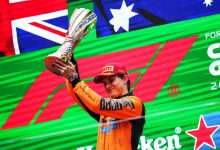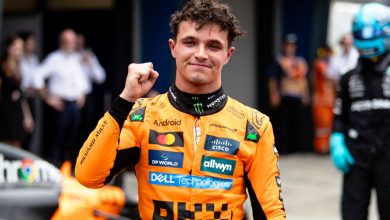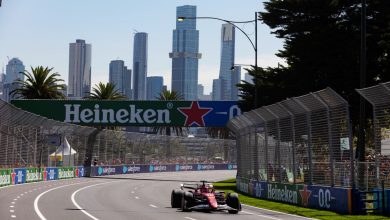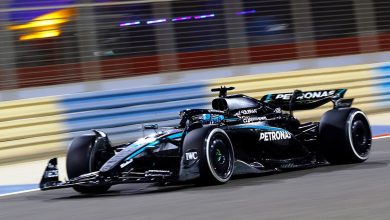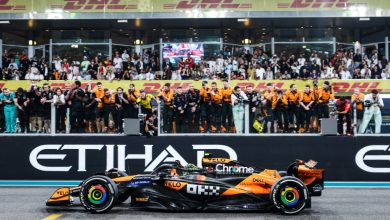Brazilian GP: Friday FIA press conference
TEAM REPRESENTATIVES –Eric BOULLIER (Lotus), Monisha KALTENBORN (Sauber), Ross BRAWN (Mercedes), Stefano DOMENICALI (Ferrari), Christian HORNER (Red Bull Racing), Martin WHITMARSH (McLaren)
Eric, first of all great news from you yesterday on the Burn sponsorship. Can you tell us a little more about it? Is it a title sponsorship? How big is it?
Eric BOULLIER: I’m not going to release any more information; we have a marketing and communication plan about the endorsement and so you will know later a little bit more detail about this deal.
Is it big enough to make a big difference to your budget for next year? Does that mean you can spend more on development? You know what it takes now.
EB: Whatever it is, it’s always welcome. It’s obviously more budget for next year and the next years, and it’s going to be good to have this brand on the car, obviously, and all the activations that go on around; also promotion for the team and Formula One.
Can you be a top contender for next year then?
EB: Ah, I don’t know yet to be honest. There is some stability in the regulations so it’s going to be up to every team to deliver a good car for next year. I cannot see any reason why we would lose some ground, I just hope that yes, we will be better. I know Kimi will be on top form from race one, so that will be a big change for us as well.
Monisha, today you announced Esteban Gutiérrez as your… number two driver I guess. How important was it to maintain the Mexican connection?
Monisha KALTENBORN: Well, it’s always good if you have stability but I think you have to also see clearly that these are two different issues. Just because Esteban is from Mexico it’s not the same situation as we had with Sergio because unlike Sergio, Esteban is not a member of the Escudería Telmex. Of course there’s a natural connection there because Telmex has this bigger vision of establishing motor sport in Mexico and Latin America, but it’s a different situation. But it’s important for the team’s stability to continue with the partners.
Both your drivers are very popular but sadly it seemed that worked against Kamui, is that the case?
MK: I won’t say it worked against him. To take up a new driver is always a strategic decision where many factors play a role. Kamui has been with us for the last three years. He’s a very good driver, he is an excellent team player and actually a very fine human being so it’s tough to take such a decision. I think if a driver deserves to be in Formula One he’s definitely one of them and I hope he can get support from Japanese companies – because Japan is an important market for Formula One – and stay in the sport.
Ross, obviously we’re losing double DRS next year. Is that going to be a big change for you for next year’s car?
Ross BRAWN: Not a huge change. Obviously as a facility it’s only of benefit when the DRS is being used and next year there’s also a move to DRS only being used in small areas during practice and qualifying, so there’s a general move away from it anyway. It’s always helpful, it would be foolish to say it’s not been an advantage, but we’ve got other solutions in place for next year.
Change in the financial structure in that Mercedes have brought back a shareholding from Aabar. How much is that changing for you? How much does that mean things change for you?
RB: No change for the team, quite frankly. I think it’s part of a bigger disinvestment Aabar are making in the Daimler group and it wasn’t logical for the Formula One team to stand out separately. So part of an overall strategy from Aabar. I think it demonstrates the commitment of Daimler to Formula One. So for our team it makes very little difference, but it gives us reassurance and confirmation of Daimler’s commitment to Formula One.
For Stefano and Christian, basically similar questions. Stefano, first of all, preparations so far: has everything gone according to plan? I’m sure you had a strategy worked out, a plan worked out for this weekend
Stefano DOMENICALI: First of all, last weekend was the birthday of Christian and this weekend is the birthday of Ross, so happy birthday Ross. We have to keep the tradition of that. We have done the job we were supposed to do today. We know that this weekend for us is a challenging weekend. We have to do the maximum on our side and that will not be enough if we want to win the Drivers’ Championship. We need to go in the race, as I said, trying to be perfect on our side and then seeing what’s going to happen. But that’s the only thing we can do and we will do.
What’s the mood like within the team?
SD: The mood is that we have nothing to lose, because we are already behind. We need to go there with a rational approach, as I said, to try to be there, if some situation will arise, we need to be prepared to take them. This is really the spirit that is around the team at the moment.
And the weather forecast doesn’t look very good. Does that work for you or against you?
SD: I’ll tell you later. Before, it’s always difficult. It can be good in terms of mixing the cars but it depends on how intense the rain is, when it will come. It is another thing on the table that has to be used in the best way we can.
Christian, similar for you: preparations so far, how have they gone.
Christian HORNER: It’s been a pretty normal Friday really. Track temperature has been very high today, so I’m sure that’s been a challenge to some degree to each of the teams, but it’s been a sensible Friday. We’ve worked through our programme with both cars and plenty of information to look at tonight. How relevant that will be, as Stefano has alluded to, with the rest of the weekend, we’ll only see when we get up in the morning and particularly on Sunday morning. It’s been very much a normal Friday for us.
And the mood within the team?
CH: Fantastic. I mean, obviously, just having sealed a third consecutive Constructors’ World Championship the mood in the team has never been as high. It’s extremely focused; we’re approaching this race just as we have the other 19 and you know for us it’s a question of trying to extract the most out of ourselves, out of the cars, out of the drivers this weekend and we’ll see where we are at the end of it. But certainly our approach to this race isn’t any different to any of the previous 19.
And is the rain, is it a variable you could do without?
CH: At the end of the day it’s the same for everybody so whoever wins this championship is going to have to have mastered different conditions, different circuits, different challenges and we could well get another factor on Sunday. We take absolutely nothing for granted despite the fact we’re coming here with a 13-point advantage. We know from our own experience how quickly that can change. We saw that in 2010 in Abu Dhabi when I think we were actually more than 13 points behind going into the race. So our focus is very much, as I say, going into this race to try and get the most out of it we can and when the chequered flag falls we’ll know where we are.
Martin, a great race last weekend for Lewis Hamilton. A great win for Jenson Button at the start of the season. You had the fastest car at the start and the end, but is it a source of frustration that you’re not involved in the title battle.
Martin WHITMARSH: Of course. I think we’ve had six great wins this year and we haven’t done a good enough job for the rest of the season one way and another and that’s a little bit frustrating, but at the moment we’re in a position where with one race to go we’re going to focus. These guys have got some pressures on their shoulders and we’re going to try and win the race. In one sense it makes it simple for us this weekend.
How much does that affect your preparations for next year, knowing what you’ve had from this?
MW: I think there’s no secrets: to be consistently winning you’ve got to have a quick car, you’ve got to have reliability. We’ve often had a quickish car this season, we’ve had a number of errors, a number of issues, which are disappointing, but we know we’ve got to work on that and we’ll aim to come out next year with a quick car and hopefully be reliable and be there at the last race.
QUESTIONS FROM THE FLOOR
Q: (Dan Knuston – Honorary) For Stefano and Christian: the championship has come down to your two drivers. Please evaluate the strengths and qualities of your driver over the season and how do you evaluate your opponent?
CH: I’ll start with my driver. I think that Sebastian has driven incredibly well this year. It’s all too easy to say he’s had the fastest car because on numerous occasions this year he hasn’t. McLaren have had a very strong car throughout this year but Sebastian has never given up, he’s kept fighting. He came back from the summer break almost 40 points behind the championship lead. He focused hard, he worked hard at it and he maximised his chances. I think he’s driven superbly well this year. He is up against a formidable opponent, who is very much at the top of his game and I think you’re witnessing two great talents and hopefully it will be an exciting race on Sunday, but I can’t speak highly enough of certainly the job Sebastian has done this year against some formidable opponents.
SD: For my side, Fernando, in my view, up to now, did one of the best seasons of his career. We knew that at the beginning of the season our car was not really the quickest. Well, I would say it was on the second half of the grid rather than the other side. He was able to extract from that the maximum out of it. He was able to get great victories in a moment where the car has improved, he drove really well in wet conditions when he was in that situation. He was always at the maximum. Always he was working with the team knowing that it was a very delicate situation for all of us in that moment. So on top of his ability on the track he was able to keep the team together in a difficult moment. So I agree, who will win will deserve it. And of course, on his side the only remark we have to say is that he was not able to do all the races because he was unfortunately kicked out two times. Not his fault, but of course in this situation where the championship is so tight they’re very heavy points. But as I said, don’t look back, look ahead. I’m sure Fernando will do the maximum of his capability to make sure… to do the best with the car that he has with a team that is working hard under a lot of pressure. I’m happy for that, because the team was able to do sometimes incredible work. As I said the spirit together I think was the most important thing… was the most significant thing, sorry, that I would like to remark on that respect.
What about Sebastian?
SD: I’m exactly of the same opinion as Christian, I speak about my driver.
Q: (Gary Meenaghan – The National) Stefano, we’re coming to the last race of the year again, and again, Ferrari are capable of winning the last race of the championship. Can you just compare how you are feeling, compared to how you felt in 2008 and 2010?
SD: Well, also 2007 we were near. Different feelings, of course. In 2007, I think that if you remember well, Martin, we were in a situation where honestly we had the same approach as at this race: try to do the best job that we can, we could, but knowing that the opponent was very strong and the race evolved in a situation where we were able, as a team, to work extremely well. Then in 2008 we were able to win the Constructors’ title, to have Felipe as World Champion of Drivers for 20 seconds, but after Hamilton won the race, in a championship where I would say we lost, if I remember well, mainly because the car was not reliable enough, because we had some races where unfortunately we had severe DNF that caused us to lose that championship. And I believe that season, Felipe did an incredible job and we were very disappointed for him, because I think we deserved it, but at the end of the day Lewis did (win).
Then 2010 was the most frustrating because we knew that we had a couple of situations to handle and it was our fault that we were not able to do it, for a mistake that we made; we didn’t help Fernando. I think that season we didn’t have the best car. I believe that we were able to always be there winning a lot of races but because of unfortunate situations that Red Bull had and we lost that championship. This is, I would say, the heaviest of my thoughts on the past. On Sunday, I think that, as I said, we are in a different spirit. We cannot look back; we need to see whatever will be the outcome we need to accept it. So therefore I would say our mindset is closer to what we had in 2007 at the moment.
Q: (Lucas Santochi Da Silva – ESPN Magazine) Christian, when do you think was the turning point of the main factors for Red Bull to develop from a medium team to a team that may now win its third title in a row?
CH: It’s a good question. Red Bull came into Formula One at the beginning of 2005. Dietrich Mateschitz had a vision. He’d been a sponsor, he’d been a shareholder and for the first time, after acquiring the Jaguar team became a team owner and his vision was very much to compete at the front in Formula One. Certainly the perception, perhaps, in the early days was that Red Bull turned up, played their music loud and were perceived as a party team, perhaps just happy to be in Formula One but underlying that was a determination to work our way to the front and slowly and steadily we gathered the right people into the team during the course of 2006 and at the beginning of 2007. We started to build, we started to work as a unit, to work as a team and then by the time the new regulations came along, a clean sheet of paper in 2009, it allowed all of the departments to demonstrate their abilities to work together as one group. In 2009, we started winning. We challenged for the championship; we fell short that year, but then we have kept that momentum. We went on to win both titles in 2010, both titles again 2011 and again a third Constructors’ championship this year. And that is purely down to the hard work, the dedication, the application of every single member of the team. We’ve got some great leadership in the team: Adrian Newey does a stunning job of leading the technical team but it requires all of the departments to do their bit. I’m extremely proud to say that they’ve absolutely done that and the testimony to that is the 34 races that we’ve won, the 80 podiums that we’ve had in only eight seasons. It’s all down to the people and of course to talented drivers: Sebastian and Mark Webber have been a very successful pairing and what Sebastian has achieved in only 100 races again is quite remarkable.
Q: (Michael Neudecker – Sud Deutsche Zeitung) Question for Mr Whitmarsh and Mr Domenicali: 2013 might be a very special year because you have to be prepared for the rule changes coming up for 2014, but at the same time you want to be successful. Maybe you can give us a general view on what you expect for 2013?
SD: I think that 2013, as you quite rightly said, in terms of regulations, will be a stability, so I’m expecting to see the situation that we are facing now in terms of performance of the team. What I believe will happen during the season, depending on how the season will go, is that some teams will start to dedicate more and more resources to the 2014 project because it’s a project that will be totally, totally different and at least on our side, we already have, at the moment, a small group of people that is working on this project, and of course, on our side, we also have the duty – being a constructor – to work on the new powertrain. For us it’s a massive job next year. This is maybe the most difficult in that respect because there are so many new things that we have to do at the same moment where we need to make sure that we are fighting for another season and championship. So for me, the 2014 season could be a year where we can see once again a split between the group of the cars in terms of pure performance. If you remember, at the beginning of this year, we had so many cars that were very very close. I’m expecting a different scenario for 2014 because all these changes which will come into place very very soon.
MW: Well, not much to add to that. I think, as Stefano alluded, I think it will be quite interesting. It will probably be two or three of the teams sat before you today who are underperforming at the halfway stage of next year’s championship and the decision that they might take to then give up on the ’13 championship and apply all of their resources to ’14 makes it quite an intriguing process. It’s a difficult one. If you’re competitive as we all aim to be next year, you’ll want to win the races, you’ll want to win the championship next year but knowing that in doing so and in applying the resources to do so, you’re actually robbing 2014. I think it’s an interesting second half of the year and as Stefano said, undoubtedly a very interesting start of 2014.
Q: (Alberto Antonini – Autosprint) As you may be aware, Honda has shown some interest in the new engine technology coming up in 2014. I would like to know whether a possible comeback by them fits the frame of the new regulations. If so, how much will you welcome Honda back in Formula One?
MW: As we just said, 2014 we’ve got, as far as I know, only three manufacturers committed to the sport. I imagine there will be a greater level of technical diversity than we currently have in powertrains just as there will be in the aerodynamic solutions that run with it. Normally, when you have a new regulation that encourages a certain amount of creativity, and then over a period of years you get a convergence onto very similar technology and very similar approach.
RB: I think this is the sort of challenge they relish, they quite like. I know from my time with them they like to have fresh technical challenges. They very much look upon Formula One as a research and development exercise and I think the new regulations appeal to them. But there’s no concrete signs they’re doing anything at the moment. I gather, as a company, they’re improving after some difficult years and I think there are lots of engineers there who would love to get involved. Whether there will be a strategic decision high up to do it, there’s no signs of that yet. But we would welcome Honda in as well. I think the more manufacturers, the more engines we have in Formula One the better.
Q: (Vanessa Ruiz – ESPN Radio) Christian, how do you see the possibility of maybe having another drink company joining Formula One as a title sponsor? Would it be bad for Red Bull? Is it a difficult or easy business model to follow? What are your thoughts?
CH: I don’t think it will be bad. I don’t think it would be bad for Formula One. I think that Red Bull welcomes competition and that’s the way it is in the market place. Red Bull’s positioning is quite unique, not only what it’s achieved as an energy drink but in terms of what it’s done and the way it carries itself in Formula One. There would certainly be no concerns from our side. I think it would be welcomed within Formula One. I have no idea what their business model is. The Red Bull one works OK.
Q: (Kate Walker – Girl Racer) Ross, happy birthday; for next year, obviously you have Lewis Hamilton signed up to drive with you. Now Lewis is something of a free spirit and the Daimler brand is not associated with free spiritedness. I was wondering if you have any plans to try and curtail Lewis’s free spirit, or if you’re just going to let him be Lewis?
RB: I think that’s going to be taken on a race-by-race, day-by-day, week-by-week basis. I think it’s impossible to predict those sort of things. I know Lewis. Obviously I’ve had a lot of conversations with him. He’s an intelligent guy, he understands Formula One, he understand the exposure Formula One gets. He understands the positioning of Daimler and an understanding of all those things, I think, will avoid any issues in the future. But I think Formula One needs characters. I think Formula One needs individuals, so we’re not going to suppress is too much. I don’t anticipate any major issues.
Q: (Ted Kravitz – Sky TV) A quick one to all of you: you’re all from quite different backgrounds: a lawyer, engineers, an ex-racing driver. Just a quick word on what makes a good team boss and whether you only look like a good team boss when you’re winning?
MW: A thick skin!
EB: When you start to win races. The proof is not only one profile, it’s just the capacity of managing the right people, to bring the right people at home, to build up the right business for your team, and obviously to seek the best drivers and make all the group of people work well together in a very competitive environment and having also a little bit of some politics around this which makes the whole package a success. I think this is a simple definition but this is the way I think it should work.
MK: I don’t think there are any hard and fast rules about that. I think we are all measured at the end of the day by performance and if you are good, if you are performing well then you must be a good team boss.
RB: I agree. I think you’re measured on your results. One of the things that is very demonstrable in Formula One is the results in the team and there’s no hiding place. But I think all of us in Formula One probably demonstrate our strengths mostly when we are failing rather than succeeding. I think the reaction to failure and how you deal with it, how you continue to motivate the team, how you continue to put all of the pieces in place is the most critical quality that all of us round here, this group needs. All of us have faced failure many times, that’s the nature of Formula One, there is only one team that can win and the rest of us are failing. How we react to that, what we do and how we try and improve our situation is, I think, the measure of being the boss of a team and trying to make it work.
SD: I agree with what they said, so really nothing to add to that
CH: I don’t think there’s any hard and fast rules. I guess the role of team principal in different teams represents different things even, and I think that fundamentally it’s a people business and it’s a question, a matter of what your background is, what your education is. It’s a matter of getting the best out of people, encouraging people and removing obstacles where necessary and sharing one vision, one goal, one objective and that needs to flow through an organisation from the top to the bottom, throughout an entire team, because Formula One is the biggest team sport in the world, and it is still a sport. You can argue that from Monday to Friday it’s a business, but at the end of the day it’s a sport where you are competing, department for department against your rivals and if you work collectively as a group, you can go on to achieve great things. There are no guarantees, nobody is owed success, but it’s a type of sport that what you put in you get out.
MW: Not much to add, really. I think a lot has been said about the team, and I think all of the Formula One teams are really great teams of people that work incredibly hard, whichever end of the grid you’re at, everyone’s working very hard. I think to be a good team member, to recognise it, just one part of the team’s important but everything else has been said already.

Ends

